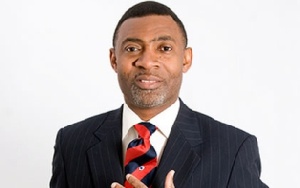Dr Lawrence Tetteh, a Ghanaian International Evangelist has called on the citizenry to agree on a development blue print for the West African nation and how it can be fulfilled.
“We do not appear to agree on a vision for our country let alone talk about how to fulfill it,” he stressed, adding: “We need ... to ask ourselves: Are we happy with our situation? How do we envision our country in the next 50 years?”
Dr Tetteh made the call in London at the inaugural ceremony of Ghana Christian Council of UK and Ireland, where he was the main speaker.
“These are questions that are not easy to answer but we can at least take the first step by putting our heads together and search for answers only with unity of purpose; for where there is a will, there is a way,” he said.
Dr Tetteh noted that a people with unity of purpose, are bound together with a band of love, tolerance and understanding and act differently.
“We embarked on the path of nationhood in the belief that the black man is capable of managing his own affairs. More than 50 years after attaining Republican status, we should begin to craft a political system that enables unity of purpose, instead of fostering division, rancour and bitterness.”
He observed that this year’s elections have acquired added significance due to the recent discovery and exploitation of oil off the coast of Ghana.
“The stakes appear to be very high due to a certain calculation that whoever lays its hands on power come January 2013, appears poised to rule Ghana for a long time and the loser condemned to a very long period in opposition, “ he noted.
Dr Tetteh said the ruling National Democratic Congress and the main opposition New Patriotic Party have alternately ruled and found themselves in opposition before and are doing everything possible to avoid going into the arid conditions of opposition.
“The margin of difference between them is very slim and the battle is now on for the hearts, minds and votes of Ghanaians.
“To this effect all manner of means are being deployed to convince Ghanaians of the virtues of the one or other political party. Insults, accusations of political malfeasance, bribery and corruption are now the order of the day. Hardly a day goes by without talk of one scandal or the other and our airwaves are full of opinions expressed in quite shrill tones.
“The country appears divided against itself and visitors to, and observers of the Ghanaian political scene are left wondering whether there is any unity of purpose left among Ghanaians.
“This situation is not helped by the spate of killings, suicides and inter-ethnic conflicts across the country. Anyone reading news on and about Ghana on the internet may come away with the impression of a country at war with itself though the reality on the ground is far from it.”
Dr Tetteh said in this globalised world, these developments have not gone unnoticed and the recent slide in the value of the local currency, the cedi against other major currencies has been attributed to the wider atmosphere of political instability associated with elections in Africa and the perceived increase in the level of corruption and fears of political violence in Ghana in particular.
This, he observed was a far cry from the period immediately after the end of the Second World War when the people of the Gold Coast were galvanised into action against colonialism by first, the United Gold Coast Convention and later Kwame Nkrumah breaking away to form the Convention People’s Party.
The International Evangelist and also the Chaplain of the Council said there is wide acceptance of the fact that it was the combination of Dr Nkrumah’s organisational skills, vision and leadership that led the Gold Coast to rally behind him to win independence for Ghana from the British Crown.
“What Nkrumah did was to forge a unity of purpose to achieve independence and then led the new country, Ghana broke away from the control of the British Crown and when Ghana became a republic on July 1, 1960, it was meant to complete our entry into full statehood,” he said.
Reverend Canon George Ansah, Chairman of the Council said the Christian body is under the auspices of the Ghana High Commission in the UK.
He said the Council would be a platform of support to all Ghanaians in the UK and Ireland.
Rev. Dr Shadrack Ofosu Ware is the Vice Chairman of the Council and Rev Mrs Mary Owusu, Secretary.
The event was witnessed by people of diverse backgrounds including Mr Steve Clifford, General Director for Evangelical Alliance of the UK who inducted the officers of the newly inaugurated Council into office.**
Diaspora News of Thursday, 19 July 2012
Source: GNA













